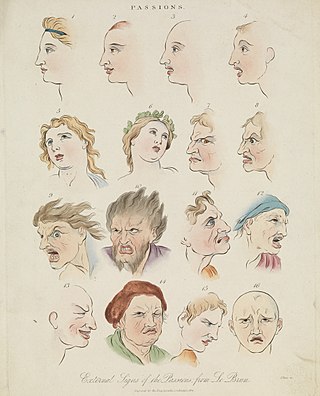Related Research Articles

The drum is a member of the percussion group of musical instruments. In the Hornbostel-Sachs classification system, it is a membranophone. Drums consist of at least one membrane, called a drumhead or drum skin, that is stretched over a shell and struck, either directly with the player's hands, or with a percussion mallet, to produce sound. There is usually a resonant head on the underside of the drum. Other techniques have been used to cause drums to make sound, such as the thumb roll. Drums are the world's oldest and most ubiquitous musical instruments, and the basic design has remained virtually unchanged for thousands of years.

Emotions are physical and mental states brought on by neurophysiological changes, variously associated with thoughts, feelings, behavioral responses, and a degree of pleasure or displeasure. There is no scientific consensus on a definition. Emotions are often intertwined with mood, temperament, personality, disposition, or creativity.

Singing is the act of creating musical sounds with the voice. A person whose profession is singing is called a singer, artiste or vocalist. Singers perform music that can be sung with or without accompaniment by musical instruments. Singing is often done in an ensemble of musicians, such as a choir. Singers may perform as soloists or accompanied by anything from a single instrument up to a symphony orchestra or big band. Many styles of singing exist throughout the world.
In psychology, a mood is an affective state. In contrast to emotions or feelings, moods are less specific, less intense and less likely to be provoked or instantiated by a particular stimulus or event. Moods are typically described as having either a positive or negative valence. In other words, people usually talk about being in a good mood or a bad mood. There are many different factors that influence mood, and these can lead to positive or negative effects on mood.

Affective computing is the study and development of systems and devices that can recognize, interpret, process, and simulate human affects. It is an interdisciplinary field spanning computer science, psychology, and cognitive science. While some core ideas in the field may be traced as far back as to early philosophical inquiries into emotion, the more modern branch of computer science originated with Rosalind Picard's 1995 paper entitled "Affective Computing" and her 1997 book of the same name published by MIT Press. One of the motivations for the research is the ability to give machines emotional intelligence, including to simulate empathy. The machine should interpret the emotional state of humans and adapt its behavior to them, giving an appropriate response to those emotions.
Background music is a mode of musical performance in which the music is not intended to be a primary focus of potential listeners, but its content, character, and volume level are deliberately chosen to affect behavioral and emotional responses in humans such as concentration, relaxation, distraction, and excitement. Listeners are uniquely subject to background music with no control over its volume and content. The range of responses created are of great variety, and even opposite, depending on numerous factors such as, setting, culture, audience, and even time of day.

Newport Music Hall is a music venue located in the University District of Columbus, Ohio, across the street from the Ohio Union of the Ohio State University. It is "America's Longest Continually Running Rock Club".

Sound Affects is the fifth studio album by English rock band the Jam. The album was released on 28 November 1980 by Polydor Records. It is the only Jam album to be co-produced by the band themselves, and contains the only album track co-written by the entire band, "Music for the Last Couple".
Affective science is the scientific study of emotion or affect. This includes the study of emotion elicitation, emotional experience and the recognition of emotions in others. Of particular relevance are the nature of feeling, mood, emotionally-driven behaviour, decision-making, attention and self-regulation, as well as the underlying physiology and neuroscience of the emotions.

Affect, in psychology, is the underlying experience of feeling, emotion, attachment, or mood. It encompasses a wide range of emotional states and can be positive or negative. Affect is a fundamental aspect of human experience and plays a central role in many psychological theories and studies. It can be understood as a combination of three components: emotion, mood, and affectivity. In psychology, the term affect is often used interchangeably with several related terms and concepts, though each term may have slightly different nuances. These terms encompass: emotion, feeling, mood, emotional state, sentiment, affective state, emotional response, affective reactivity, disposition. Researchers and psychologists may employ specific terms based on their focus and the context of their work.
The psychology of music, or music psychology, may be regarded as a branch of psychology, cognitive science, neuroscience, and/or musicology. It aims to explain and understand musical behaviour and experience, including the processes through which music is perceived, created, responded to, and incorporated into everyday life. Modern psychology of music is primarily empirical; its knowledge tends to advance on the basis of interpretations of data collected by systematic observation of and interaction with human participants. The field has practical relevance for many areas, including music performance, composition, education, criticism, and therapy, as well as investigations of human attitude, skill, performance, intelligence, creativity, and social behavior.

Euphoria is the experience of pleasure or excitement and intense feelings of well-being and happiness. Certain natural rewards and social activities, such as aerobic exercise, laughter, listening to or making music and dancing, can induce a state of euphoria. Euphoria is also a symptom of certain neurological or neuropsychiatric disorders, such as mania. Romantic love and components of the human sexual response cycle are also associated with the induction of euphoria. Certain drugs, many of which are addictive, can cause euphoria, which at least partially motivates their recreational use.

Steve Goodman, known as Kode9 is a Scottish electronic music artist, DJ, and founder of the Hyperdub record label. He was one of the founding members of the early dubstep scene with his late collaborator The Spaceape. He has released four full-length albums: 2006's Memories of the Future and 2011's Black Sun, Nothing (2015), Escapology and Astro-Darien (2022).
Aesthetic emotions are emotions that are felt during aesthetic activity or appreciation. These emotions may be of the everyday variety or may be specific to aesthetic contexts. Examples of the latter include the sublime, the beautiful, and the kitsch. In each of these respects, the emotion usually constitutes only a part of the overall aesthetic experience, but may play a more or less definitive function for that state.

In psychology, negative affectivity (NA), or negative affect, is a personality variable that involves the experience of negative emotions and poor self-concept. Negative affectivity subsumes a variety of negative emotions, including anger, contempt, disgust, guilt, fear, and nervousness. Low negative affectivity is characterized by frequent states of calmness and serenity, along with states of confidence, activeness, and great enthusiasm.

Vukašin Brajić is a Bosnian Serb pop-rock singer who rose to fame after participating in the first season (2008–09) of Operacija trijumf, the ex-Yugoslav version of Star Academy, in which he came in second place.

Extraversion and introversion are a central trait dimension in human personality theory. The terms were introduced into psychology by Carl Jung, though both the popular understanding and current psychological usage are not the same as Jung's original concept. Extraversion tends to be manifested in outgoing, talkative, energetic behavior, whereas introversion is manifested in more reflective and reserved behavior. Jung defined introversion as an "attitude-type characterised by orientation in life through subjective psychic contents", and extraversion as "an attitude-type characterised by concentration of interest on the external object".
Culture in music cognition refers to the impact that a person's culture has on their music cognition, including their preferences, emotion recognition, and musical memory. Musical preferences are biased toward culturally familiar musical traditions beginning in infancy, and adults' classification of the emotion of a musical piece depends on both culturally specific and universal structural features. Additionally, individuals' musical memory abilities are greater for culturally familiar music than for culturally unfamiliar music. The sum of these effects makes culture a powerful influence in music cognition.

Research into music and emotion seeks to understand the psychological relationship between human affect and music. The field, a branch of music psychology, covers numerous areas of study, including the nature of emotional reactions to music, how characteristics of the listener may determine which emotions are felt, and which components of a musical composition or performance may elicit certain reactions.
The psychology of music preference is the study of the psychological factors behind peoples' different music preferences. One study found that after researching through studies from the past 50 years, there are more than 500 functions for music. Music is heard by people daily in many parts of the world, and affects people in various ways from emotional regulation to cognitive development, along with providing a means for self-expression. Music training has been shown to help improve intellectual development and ability, though minimal connection has been found as to how it affects emotion regulation. Numerous studies have been conducted to show that individual personality can have an effect on music preference, though a recent meta-analysis has shown that personality in itself explains little variance in music preferences. These studies are not limited to American culture, as they have been conducted with significant results in countries all over the world, including Japan, Germany, Spain, and Brazil.
References
- ↑ "On Affect". Archived from the original on 2006-08-13. Retrieved 2024-12-28.